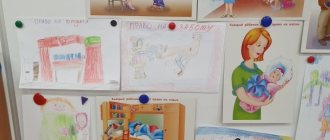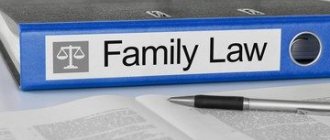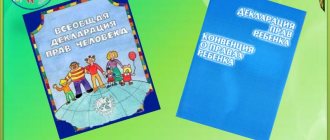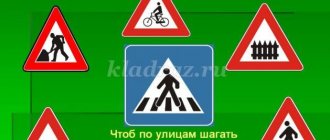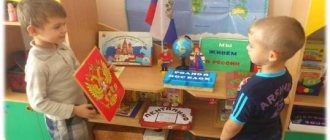Week of legal education for preschoolers, methodological development
Week of Legal Education of Preschool Children
Educational activities were carried out with older pupils on the following topics:
- "What are human rights"
- “The child’s right to a first name, patronymic and last name”
- “The right of a child to live and be raised in a family”
- “The child’s right to health care”
- "Child's rights to education"
- “Rights and responsibilities of the child”
- "Right to defense."
Conversations with children:
- “What are the rights of the child”
- "How to be friends without arguing"
- "Everyone has a name"
- “Life is given for good deeds”
Games and problem situations for preschoolers:
- "What is good and what is bad"
- “They didn’t share the toy”
- "There's a friend next to you"
- “Forbidden - allowed”
- “We are different, but we have equal rights”
Parents of the older group designed a wall newspaper “The Rights and Responsibilities of Children.”
Educators have prepared consultations for parents:
- “Legal education of older preschoolers”,
- “The history of the formation of legislation on the rights of the child”,
- "Is it possible to do without punishment"
- "The child and his rights."
We produced information booklets “Child Rights” on child protection issues and distributed them among parents.
We issued instructions for parents:
- “When punishing, think: why?”
- "The Art of Being a Parent"
- "Four Commandments of a Wise Parent"
A workshop was held with educators “Protecting the rights and dignity of a small child. Coordination of the efforts of the family and the preschool educational institution.”
An exhibition of literature on the legal education of preschool children was presented.
A consultation on “Legal Education of Preschool Children” was also prepared for educators.
An exhibition of joint works by parents and children “I have the right to... I am a human being!” was organized.
All work in the preschool educational institution within the framework of the Day of Legal Assistance for Children was built in accordance with the Convention on the Rights of the Child, Federal Law of December 21, 1996 No. 159-FZ “On the Basic Guarantees of the Rights of the Child in the Russian Federation.”
November 20 this year The All-Russian Day of Legal Assistance for Children will take place, established by the decision of the Government Commission on the Implementation of the Federal Law “On Free Legal Assistance in the Russian Federation” in pursuance of the Decree of the President of Russia dated December 28, 2012. No. 1688 “On some measures to implement state policy in the field of protection of orphans and children left without parental care.”
| № | Name, theme of the event | Dates | Responsible | ||
| With kids | With parents | with teachers | |||
| 1 | “Where Health Hides” - an open OA from the “Healthy Lifestyle” series Reviewing illustrations and presentations about rights. | Distribution of thematic booklets on children's rights, promotion of responsible parenting, prevention of family violence, child abuse, etc. | Exhibition of literature on legal education of preschool children | In a week | Educators, Art. teacher |
| 2 | Conversations with children: - “What are the rights of the child” - “How to be friends without quarreling” -“Everyone has a name” - “Life is given for good deeds” GCD “I am the most, the most!” (the right to preserve one’s individuality) | Design of an information stand and website page on legal education of parents (regulatory documents (extracts from the Constitution of the Russian Federation, the UN Convention on the Rights of the Child, the Family Code of the Russian Federation, the Law on Education, etc.), contact numbers of services for the protection of the rights of minors are indicated) | Consultation for educators “Legal education of preschool children” | In a week | Educators |
| 3 | Games and problem situations for preschoolers: -"What is good and what is bad" - “They didn’t share the toy” - “A friend is next to you” - “Prohibited - allowed” -“We are different, but we have equal rights” | Design of a group thematic stand for parents “With kindness to the child.” | Workshop “Protecting the rights and dignity of a small child. Coordination of efforts of family and preschool educational institution" | In a week | Educators |
| 4 | Reading literary works on the topic | Preparation of instructions for parents: “Is it possible to do without punishment?” "The Art of Being a Parent" | questionnaire “Style of pedagogical communication” | In a week | Teacher-psychologist, educators |
| 5 | Design of the thematic exhibition: "Me and my rights" | Consulting parents and teachers on this topic | presentation on legal education of preschool children | In a week | educational psychologist, preschool teachers |
| 8 | Watch videos and cartoons on the topic. | Conducting parent meetings and conversations “On the inadmissibility of child abuse; Errors in family upbringing and their impact on the formation of a child’s value system.” | Reminders — “Signs of Abuse and Violence” — “Protection of the rights and dignity of the child in legislative acts” — “Studying the family atmosphere” | In a week | Educators |
Project in kindergarten for older preschoolers 5-7 years old on legal topics
Project “Great Rights for Small Citizens”
Dear residents of the “Ped-piggy bank”, I would like to bring to your attention my experience of working on children’s rights.
“Someone's legs walked along a winding path through the world. Looking into the distance with wide eyes, the little girl went to get acquainted with her rights. Nearby, my mother held her hand tightly and accompanied her clever girl on the journey. Both adults and children should know about the rights that protect them in the world.” Children’s rights today have become a “fashionable” topic, our country has embarked on the path of establishing a rule of law state, and in a civilized society, human rights and interests should be put in first place. A necessary condition for this is the awareness of people, their knowledge of their rights and responsibilities. Preschool childhood is a unique period in a person’s life, during which health is formed and personality develops. And at the same time, this is a period when the child is completely dependent on the adults around him - parents and teachers. Having started working on this topic, I set myself the following tasks: -to study literature, documents on this topic, -to acquaint parents with legal documents, with the history of the adoption of the UN Convention on the Rights of the Child and the rights enshrined in it, to give an idea of protection rights of the child, thereby increasing the level of legal culture of parents - introducing children in an age-appropriate manner to the basic documents on the protection of human rights and their rights. I planned all my work in three stages: 1. get acquainted with the documents, study the material. 2. plan work with children. 3. work with parents. Having studied the literature and documents, I found out for myself that children’s rights are a set of rights enshrined in international documents on children’s rights. The main documents include: -Declaration of the Rights of the Child -Convention on the Rights of the Child -World Declaration A declaration is an official or solemn statement. A convention is a contract, an agreement that sets out the rules forming for the parties. November 20 is considered to be the day of legal knowledge. And then there is a list of the rights of the child that are included in the convention. Then I prepared the games, selected the appropriate literature, and began working with the children.
We started with an introductory conversation, looked at the pictures, found out what rights exist and what rights we, children, have. We outlined what rights we would like to get acquainted with in detail. When getting acquainted with the “right to a name”, I held conversations: “What does your name mean”, “My full name”, held a competition “My name”, where each child, together with their parents, made a business card of their name, played games “Affectionate” name”, “Recognize by voice”, “Name is growing”.
When getting acquainted with the “right to housing”, I held conversations “The house you live in”, “My house is my fortress”, played the games “Give me your address”, “Who has the right to live in my house”, read the fairy tale “The Three Little Pigs” ", "", held a drawing competition "My Home".
Getting acquainted with the “right to live in a family,” we talked about how to take care of our loved ones and how to help them. The children talked about their families and how they relax. Family photo albums were prepared together with the parents. Conducted a drawing competition “My Family”. We played games “Mothers and Daughters”, My Family.” Homework was to make a family tree.
We finished all the work with the final quiz “Great rights for a small citizen”, remembered fairy tales, riddles, played games. When working with parents, the first stage was the use of visual information. A parent meeting was held on this topic. To identify the level of pedagogical culture, I conducted a series of questionnaires: “What kind of parent are you,” “my attitude towards punishment.” I used sliding folders. The parents showed activity, invention and creativity when doing homework: “family tree”, drawings “my family”, “compiling a family photo album”. To summarize, we can say that all this work helps to establish trusting relationships with children’s families, parents become full participants in the educational process, children feel comfortable at home and in the garden. The main idea of work on the legal education of preschool children is the recognition of the child as a full-fledged and full-fledged person: free and responsible, knowing his rights. The Convention proclaims the child to be an independent subject of law, and our task is to bring the Convention to the consciousness of children in an accessible form. And it is better to start such work with children of older preschool age. Because children 5-7 years old adequately perceive this material and manage their behavior. By the end of preschool age, the child becomes active, aware of himself as a subject of his own activities in relationships with adults and peers. Thank you for your attention.
We recommend watching:
Pedagogical project in the junior and middle groups of preschool educational institutions Research project in the preparatory group Classes with older preschoolers 5 - 7 years old. One day project Project in the middle group “Mushrooms”
Similar articles:
Development of communication skills in design and research activities in preschoolers
Project for children of the senior group “Our cheerful garden”
Creative project in the senior group on the topic “The Mysterious World of Insects”
- On the All-Russian Day of Legal Assistance for Children
CHILD'S RIGHTS (Rights of children) are those rights and freedoms that every child should have (every person under 18 years of age is considered a child), regardless of any differences: race, gender, language, religion, place of birth, national or social origin, property, class or other status.
Events at preschool educational institutions dedicated to the All-Russian Day of Legal Assistance for Children in 2022
- Conversation “For children about children’s rights”
- Conversation “Every child has a right”
- Video “I am a child, and I have the right!”
The definition of children's rights follows logically from the basic ideas of the Universal Declaration of Human Rights. Her separate article is dedicated to children. It states that “Motherhood and childhood give the right to special care and assistance.” Thus, while recognizing the equal rights of children to all the freedoms proclaimed in the declaration, the international community recognizes the need for additional assistance and support for children.
For the harmonious development of personality, a child must grow up in an atmosphere of love and kindness, in a family, among close and loving people. The task of adults is to help the child prepare for independent life, become a full member of society, and create conditions for the child to have normal physical and intellectual development.
The development of the concept of human rights led to the fact that children's rights were allocated to a special category. At the beginning of the 20th century, children's rights were generally viewed in the context of existing problems of child labor, child trafficking, and underage prostitution. The need to legislatively ensure the protection of children's health and protection of their rights prompted the League of Nations to adopt the Geneva Declaration of the Rights of the Child in 1924.
The next important step was the adoption by the UN of the Declaration of the Rights of the Child in 1959, which proclaimed social and legal principles concerning the protection and well-being of children. In it about. The document consists of 10 provisions (principles, as they were called in the Declaration), recognition and compliance with which should allow “to ensure children a happy childhood.”
A child in the Russian Federation is a person under the age of 18 (the age of majority).
The rights of children in the Russian Federation are regulated by the following laws:
- “Convention on the Rights of the Child” (approved by the UN General Assembly on November 20, 1989, entered into force for the USSR on September 15, 1990);
- Constitution of the Russian Federation;
- Family Code of the Russian Federation;
- Federal Law of November 21, 2011 N 323-FZ “On the fundamentals of protecting the health of citizens in the Russian Federation”;
- Federal Law of December 29, 2012 N 273-FZ “On Education in the Russian Federation”;
- Federal Law of July 24, 1998 N 124-FZ “On the Basic Guarantees of the Rights of the Child in the Russian Federation”;
- Federal Law of December 21, 1996 N 159-FZ “On additional guarantees for social support for orphans and children without parental care”;
- Federal Law of November 24, 1995 N 181-FZ “On the social protection of disabled people in the Russian Federation.”
What rights does a child have under current legislation?
The child has the right to a first name, patronymic and last name, and citizenship.
The first name is given to the child by the parents, the middle name is given by the father’s name, the last name is given by the parents, or if the parents have different last names, then by mutual agreement the parents choose one of the last names.
If parents cannot come to a common opinion on the issue of the child’s first and last name, this issue is resolved by the guardianship and trusteeship authority.
Parents, until the child is 14 years old, can change his first or last name with the permission of the guardianship authority. If the child is 10 years old, changing his first or last name is possible only with his consent.
A child has the right to live and be raised in a family, with his parents, who must take care of his upbringing, education, and development.
The child has the right to communicate with both of his parents, as well as other relatives. Divorce of parents and their separation should not affect the rights of the child, even if one of the parents lives in another state.
Competent authorities may prohibit one of the parents (or both parents) from communicating with the child only if such actions are necessary to protect the rights and interests of the child.
The child has the right to protection of his rights and interests.
The responsibility to protect the rights and legitimate interests of the child rests with the parents or legal representatives, and in their absence, with the guardianship and trusteeship authorities.
If a child, before reaching the age of 18, is recognized as fully capable in accordance with the law, he has the right to independently defend his rights.
A child has the right to protection from abuse by his parents or legal representatives (guardians, trustees, etc.).
Abuse can be expressed in physical or psychological violence, insult, humiliation of a child, sexual harassment, intimidation of a child, etc. A child can independently apply to the guardianship and trusteeship authorities (and upon reaching the age of 14, directly to the court) with a demand to protect him from such abuse.
The child has the right to freely express his views on all issues that concern him and his family relationships.
The child's opinion may be heard in court hearings. Taking into account the opinion of a ten-year-old child in a court hearing is mandatory if this does not infringe on the rights of the child.
The child also has the right to express his own opinion in the form of receiving and transmitting any information, both in written and oral form (works of art and other means).
The child has the right to freedom of thought, conscience and religion, freedom of association and assembly.
The child has the right to access information.
Information must have a favorable moral orientation and contribute to the full physical and mental development of the child. He must be protected from other information that is harmful to the well-being of the child, including at the legislative level.
In order to protect children from information harmful to their health and (or) development, Federal Law of December 29, 2010 N 436-FZ “On the protection of children from information harmful to their health and development” was adopted.
The child has the right to personal and family life, the inviolability of his home, the right to keep his correspondence, telephone conversations, and personal data secret.
In case of infringement or unlawful interference, the rights of the child are protected.
A child deprived of parents has the right to protection and assistance from the state.
For this purpose, adoption procedures are used, transfer to a foster family, or to appropriate social institutions created for the care, upbringing and education of children left without parents.
Parents, due to their physical and financial capabilities, are obliged to provide their child with the standard of living necessary for his physical and spiritual development. The state, in turn, is obliged to provide support to parents whose capabilities do not allow them to provide an adequate standard of living for their child.
For example, low-income families are provided with some guarantees and benefits. The state provides financial support and benefits to large families.
The child has the right to a full standard of living.
The child has the right to health care and medical care, and the use of the most advanced methods and services, as well as priority in the provision of medical services.
For these purposes, the child is provided with free medical care in state (municipal) institutions, including the prevention of various diseases, diagnosis and treatment, rehabilitation, sanatorium treatment and health improvement for children.
The child has the right to education.
Education should be aimed at the comprehensive development of the child’s personality, talents, physical and moral education.
Pre-school, basic general and secondary vocational education in state and municipal institutions is publicly available and free of charge.
A child can receive higher education by passing a competition. Subject to successful completion, higher education in state and municipal universities is also free.
A child has the right to rest and entertainment appropriate to his age, the right to participate in cultural events, and engage in creativity and art.
A child has the right to protection from exploitation, from performing work that is harmful to his physical or mental health, or that interferes with his education.
For this purpose, the Labor Code of the Russian Federation establishes appropriate rules, in particular determining the age at which a child can be hired, the length of his working day, the prohibition of performing certain types of work, etc.
A child who is physically or mentally disabled has the right to special care and special conditions.
Such a child also has the right to a full and dignified life. The state provides such children with appropriate guarantees and benefits and provides their parents with financial assistance.
The child has property rights.
These include the right to receive maintenance from one's parents. A child has the right of ownership to income that he personally received, to property given to him, inherited or acquired with his personal funds.
He can dispose of this property according to the rules established by the Civil Code of the Russian Federation (Articles 26 and 28 of the Civil Code of the Russian Federation).
AdmirorGallery 4.5.0, author/s Vasiljevski & Kekeljevic.
PERSPECTIVE PLAN FOR LEGAL EDUCATION calendar and thematic planning on the topic
Long-term work plan.
Topic: “Legal education of preschool children”
Tasks:
— Creating conditions for the development of legal competence in children;
— familiarizing children in a form appropriate to their age with social and legal norms and rules of behavior;
- instilling in children a respectful and tolerant attitude towards people, regardless of their origin, language, gender, age;
- promoting the process of developing in children a sense of self-worth, their opinions and the skills of expressing them;
— providing the necessary assistance to families in matters of legal education of children. Confirm the feasibility of conducting such classes by educators.
Work with children.
Subject. Goals. Vocabulary.
September
1 “What is law?”
Introduce children to the concept of “Right”. Foster respect for human rights. Contribute to the education of legal culture. Rights, duties, state, declaration.
2. “Everyone has a name”
Formation of ideas about the name, traditions of naming people in accordance with age and the role of the name in a person’s life. First name, first names, last name, patronymic, age
October
1. "Family - seven selves." To deepen children’s understanding of family well-being and the protection of children’s rights by family members. Well-being, friendly family, relatives, love, care, respect, protection, responsibilities, rights
2. “Away is good, but home is better.” Formation of ideas about human needs for housing and the right to housing. House, apartment, rooms, residents, order, disorder, food, store, money.
November
1. “How to be friends without quarreling.” Formation of conflict-free behavior and communication skills in children. Good, evil, insult, deception, punishment, worry, get upset.
2. “I will stand for what is mine, but I will not take someone else’s.” Formation of ideas about property and personal belongings. Personal things, common things, someone else's, one's own, punishment, harm, take other people's things without permission (steal)
December
1. “Do I want or need it?” Development of independence and responsibility, formation of skills for joint activities, Help, action, care, courtship, resentment, forgiveness, friendship, friend, friendliness, sympathy.
2. “It is bad for him who does no good to anyone.” Formation of respectful attitude of children towards each other and skills of conflict-free behavior and communication. Resentment, quarrel, bad deed, evil, good, evil, greed, generosity.
January
1. “Whatever you don’t like, don’t do it yourself.” Reinforcing basic rules of behavior in kindergarten, developing skills of polite treatment and behavior. Respect, patience, attention, understanding, rules, kind, polite, attentive, responsive, non-greedy..
2. “Secrets of politeness.” Familiarization with the rules of polite attitude towards other people and development of polite treatment skills in children. Respect, rules, politeness, you, you, nickname, ridicule, polite words, goodbye, hello, etc.
February
1. “Children and adults.” Deepening understanding of the differences between people of different genders and ages and their social roles. Boy, girl, aunt, uncle, old man, old woman, age, help, care.
2. “Life is given for good deeds.” Cultivating a friendly attitude towards people. Respect, age, elderly, old age, childhood, help, good deeds.
March
1. “Who lives where?” Introducing children to different countries and peoples Country, peoples, geographical map, foreign, nationality, race, faith, similarities, differences
2. “My Motherland”. Formation of ideas about your country, the main city of Russia and respect for your small homeland. Country, homeland, Russia. Russians, capital, city, flag, coat of arms, territory.
April
1. “Work and rest.” Introduce the right to work and rest. To consolidate the understanding that every person needs both work and rest. Work, work, help, responsibilities, rest, child labor, adult labor.
2. “Learning to read and write is always useful.” Expand children's understanding of the role of education in the life of every person. Knowledge, learning, education, literate.
May
1. “Every little child should know this from the cradle.” Formation of safe behavior skills in children in relationships with adults and peers in public places Rules, violator, criminal, safety, attention, prohibited, death, injury. Diagnosis of the level of children’s mastery of knowledge and skills
Working with parents.
| No. | Name. | Term | Task. |
| 1 | Meeting “Parents’ rights, children’s rights” | September. | Identification of the level of legal culture of parents. Uniting a team of parents and children to achieve a common result. |
| 2 | Folder – movement “Children’s Rights” | October | |
| 3 | Booklet “What’s in your name...” | November | |
| 4 | “Reward and Punishment” – eight rules for adults | December | |
| 5 | Consultation “Children's box pros and cons” | January | |
| 6 | Reminder: Child Abuse | February. | |
| 7 | Consultation “Do we understand our children?” | March | |
| 8 | Meeting “Do we know how to resolve conflicts with children” | April | |
| 9 | Parent survey. | May. |
Working with teachers.
| No. | Name. | Term | Task. |
| 1 | Questioning of teachers. | September. | Identification of the level of legal culture of teachers. Providing necessary assistance in matters of legal education of children. |
| 2 | Booklet “Convention on the Rights of the Child” | October | |
| 3 | Reminders “Child Abuse” | November | |
| 4 | Consultation “Legal education in kindergarten” | December | |
| 5 | Consultation “Why are children different?” | January | |
| 6 | Consultation “Respect for children’s rights in preschool educational institutions” | February. | |
| 7 | Presentation “Legal education of children of senior preschool age” | April | |
| 8 | Exhibition of materials on the topic. | May |
Literature:
1. Burkatskaya A. Reward and punishment // Child in kindergarten. – 2007. – No. 5
2. Gladkova Yu. Teacher and family. Problems of interaction // Preschool education. – 2008. – No. 4
3. Golitsina N.S., Ogneva L.D. Familiarization of older preschoolers with the Convention on the Rights of the Child. – M.: Publishing House Skriporiy 2003, 2005.
4. Davydova O. I., Vyalkova S. M. Conversations about responsibility and rights of the child. – M.: TC Sfera, 2008.
5. Danilina T. A., Lagoda T. S., Stepina N. M. How to introduce preschool children to the Convention on the Rights of the Child // Preschool Education Management. – 2002. – No. 6.
6. Doronova T. N. Interaction of a preschool institution with parents: A manual for employees of preschool educational institutions. – M., 2002.
7. Zelenova N. G., Osipova L. E. I am a child, I have the right. M.: Publishing House Skriporiy 2003, 2007.
8. Kopytova N. N. Legal education in preschool educational institutions. – M.: TC Sfera, 2006.
9. Shorygina T. A. Conversations about good and bad behavior. - M.: TC Sfera, 2007.
